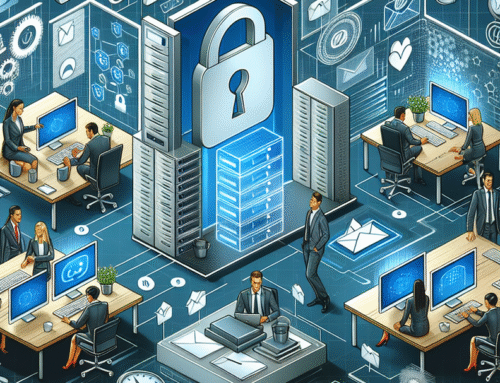Understanding the Importance of Effective Email Management
Email has become an indispensable part of our personal and professional lives. Managing emails efficiently is crucial for productivity, organization, and overall success in today’s fast-paced digital world. By understanding the importance of effective email management, you can streamline your communication, boost productivity, and maintain a healthy work-life balance.
Why Understanding the Importance of Effective Email Management Matters
1. **Enhanced Productivity**: Efficient email management helps you prioritize tasks, respond promptly, and avoid unnecessary distractions, leading to increased productivity.
2. **Improved Organization**: Proper email management allows you to categorize, archive, and retrieve emails easily, ensuring important information is accessible when needed.
How to Get Started with Understanding the Importance of Effective Email Management
- **Step 1: Implement a Filing System**: Create folders or labels to categorize emails based on priority, projects, or senders.
- **Step 2: Set Clear Communication Guidelines**: Establish email response times and communication protocols to manage expectations effectively.
- **Step 3: Regular Inbox Cleanup**: Schedule regular intervals to declutter your inbox, archive important emails, and delete unnecessary ones.
Advanced Strategies for Understanding the Importance of Effective Email Management
- **Strategy 1: Email Filters**: Utilize email filters to automatically sort incoming emails into designated folders, saving time and improving organization.
- **Strategy 2: Unsubscribe and Opt-Out**: Regularly review and unsubscribe from unnecessary mailing lists to reduce inbox clutter and focus on essential emails.
The Future of Understanding the Importance of Effective Email Management
As technology evolves, artificial intelligence and machine learning tools will play a significant role in email management, offering predictive email sorting, smart replies, and enhanced security features to improve efficiency and productivity.
Summary
Effective email management is not just about organizing your inbox; it’s about optimizing your workflow, improving communication, and reducing stress. Embracing efficient email practices can transform the way you work and lead to a more balanced and productive professional life.
Next Steps
Start implementing some of the practical tips mentioned above to streamline your email management process. Stay updated on the latest trends and tools in email productivity to stay ahead in the digital age.
Top Tools and Software for Efficient Email Handling
Key Insights and Strategies
Efficient email handling is crucial for productivity and communication. Utilizing the right tools and software can streamline your email management process, saving you time and ensuring effective correspondence.
Key strategies include using email organization features, automating repetitive tasks, setting up filters, and integrating with other productivity tools for seamless workflow.
Step-by-Step Guide
- Step 1: Opt for an email client with advanced features like categorization, priority inbox, and snooze options.
- Step 2: Configure email filters to automatically sort incoming emails into specific folders based on sender, subject, or keywords.
- Step 3: Integrate your email client with task management tools to convert important emails into actionable tasks for better prioritization.
Best Practices for Organizing and Prioritizing Emails
When it comes to managing your email inbox efficiently, implementing the right strategies can significantly enhance your productivity. Here are some best practices to help you effectively organize and prioritize your emails:
1. Use Folders and Labels:
Create folders or labels based on different categories, projects, or priorities. This allows you to sort incoming emails and easily locate them when needed.
2. Set up Filters:
Automate the process by setting up filters to direct emails to specific folders or apply labels. This helps in streamlining your inbox and ensures that important emails are not missed.
3. Prioritize Your Inbox:
Develop a system to prioritize emails based on urgency and importance. Respond to critical emails promptly and schedule time to address others based on their relevance.
4. Unsubscribe and Manage Subscriptions:
Regularly review and unsubscribe from newsletters or subscriptions that are no longer relevant. Keeping a clean inbox reduces clutter and helps you focus on essential emails.
5. Use Email Management Tools:
Explore email management tools that offer features like snooze, reminders, and priority inbox. These tools can help you stay organized, set reminders, and focus on critical emails without distractions.
6. Schedule Specific Email Check-in Times:
Avoid constantly checking your inbox throughout the day. Instead, schedule specific times to check and respond to emails. This practice prevents interruptions and improves your concentration on other tasks.
7. Archive Completed Emails:
Once you have addressed an email and no longer need it for reference, archive it instead of keeping it in your inbox. Archiving helps declutter your inbox while still allowing you to search for past emails if required.
By implementing these best practices, you can streamline your email management process, reduce inbox overload, and ensure that you stay organized and efficient in handling your emails.
Tips for Reducing Email Overload and Boosting Productivity
Frequently Asked Questions (Q&A)
Q: What’s the biggest challenge with Reducing Email Overload and Boosting Productivity?
A: Juggling through countless emails can overwhelm individuals, hampering productivity levels. Finding a balance between responding promptly and focusing on core tasks is a common struggle.
Q: How can I make Reducing Email Overload and Boosting Productivity more effective?
A: Take advantage of email management tools that offer features like priority inbox sorting, scheduling emails to be sent later, and setting up filters to organize your emails efficiently. Additionally, establishing set times for checking emails and adopting email batching techniques can significantly reduce overload and boost overall productivity.





